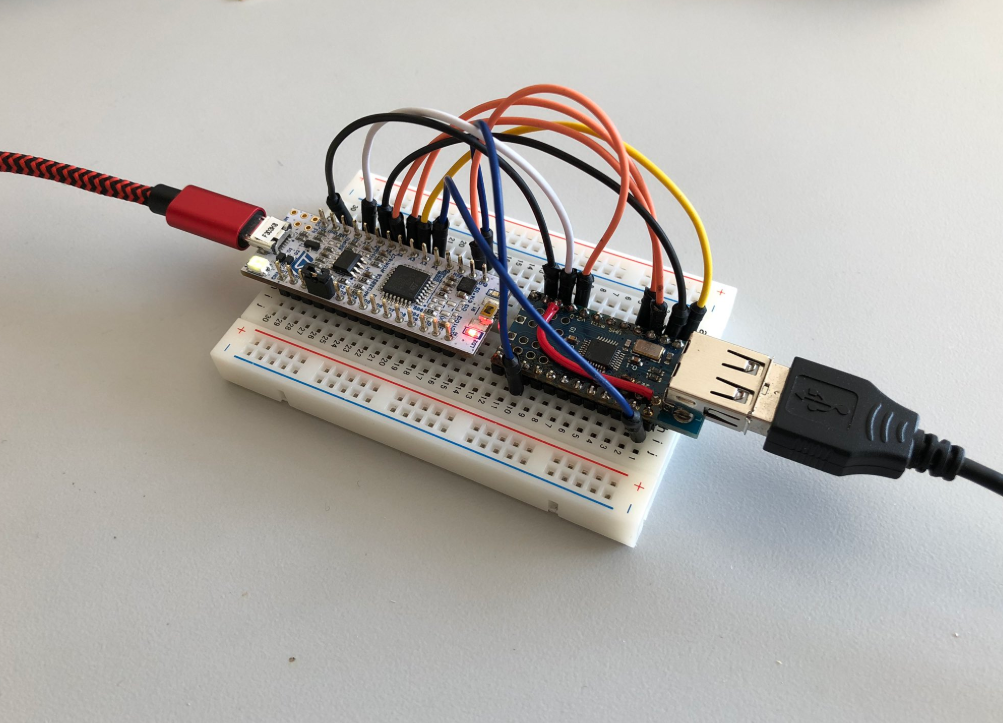Library to use Arduino USB host shield on mbed
ArduinoのUSB Host Shield 2.0をmbedで使えるようにしたライブラリです。
大体のコードがArduinoからそのまま移植可能です。
Arduino UNOやMega用のホストシールド以外にもミニサイズのホストシールドでも使用可能です

シールドについて
3.3VのI/O用にシールドの改造が必要になりますがネット上に記事がたくさんあるのでそちらを参考にしてください
接続例

使い方
Arduinoのコードと違うのはUSBのインスタンスの宣言部分のみです。
ピンを自分で指定できるようにしたので使いやすくなりました。
仕様
- Arduinoのmillis関数、micros関数の移植のために内部でTimerクラスを使用しています。
main.cpp
#include "mbed.h"
#include <PS3BT.h>
#include <usbhub.h>
Serial pc(USBTX, USBRX, 115200);
//Nucleo f303k8用
USB Usb(A6, A5, A4, A3, A2); // mosi, miso, sclk, ssel, intr
BTD Btd(&Usb);
PS3BT PS3(&Btd);
int main()
{
bool printAngle = false;
if (Usb.Init() == -1)
{
pc.printf("\r\nOSC did not start");
while (1); // Halt
}
pc.printf("\r\nPS3 USB Library Started");
while (1)
{
Usb.Task();
if (PS3.PS3Connected || PS3.PS3NavigationConnected) {
if (PS3.getAnalogHat(LeftHatX) > 137 || PS3.getAnalogHat(LeftHatX) < 117 || PS3.getAnalogHat(LeftHatY) > 137 || PS3.getAnalogHat(LeftHatY) < 117 || PS3.getAnalogHat(RightHatX) > 137 || PS3.getAnalogHat(RightHatX) < 117 || PS3.getAnalogHat(RightHatY) > 137 || PS3.getAnalogHat(RightHatY) < 117)
{
pc.printf("\r\nLeftHatX: %d", PS3.getAnalogHat(LeftHatX));
pc.printf("\tLeftHatY: %d", PS3.getAnalogHat(LeftHatY));
if (PS3.PS3Connected)
{ // The Navigation controller only have one joystick
pc.printf("\tRightHatX: %d", PS3.getAnalogHat(RightHatX));
pc.printf("\tRightHatY: %d", PS3.getAnalogHat(RightHatY));
}
}
// Analog button values can be read from almost all buttons
if (PS3.getAnalogButton(L2) || PS3.getAnalogButton(R2))
{
pc.printf("\r\nL2: %d", PS3.getAnalogButton(L2));
if (!PS3.PS3NavigationConnected)
{
pc.printf("\tR2: %d", PS3.getAnalogButton(R2));
}
}
if (PS3.getButtonClick(PS))
{
PS3.disconnect();
pc.printf("\r\nPS");
}
if (PS3.getButtonClick(TRIANGLE))
pc.printf("\r\nTriangle");
if (PS3.getButtonClick(CIRCLE))
pc.printf("\r\nCircle");
if (PS3.getButtonClick(CROSS))
pc.printf("\r\nCross");
if (PS3.getButtonClick(SQUARE))
pc.printf("\r\nSquare");
if (PS3.getButtonClick(UP))
{
pc.printf("\r\nUp");
PS3.setLedOff();
PS3.setLedOn(CONTROLLER_LED4);
}
if (PS3.getButtonClick(RIGHT))
{
pc.printf("\r\nRight");
PS3.setLedOff();
PS3.setLedOn(CONTROLLER_LED1);
}
if (PS3.getButtonClick(DOWN))
{
pc.printf("\r\nDown");
PS3.setLedOff();
PS3.setLedOn(CONTROLLER_LED2);
}
if (PS3.getButtonClick(LEFT))
{
pc.printf("\r\nLeft");
PS3.setLedOff();
PS3.setLedOn(CONTROLLER_LED3);
}
if (PS3.getButtonClick(L1))
pc.printf("\r\nL1");
if (PS3.getButtonClick(L3))
pc.printf("\r\nL3");
if (PS3.getButtonClick(R1))
pc.printf("\r\nR1");
if (PS3.getButtonClick(R3))
pc.printf("\r\nR3");
if (PS3.getButtonClick(SELECT))
{
pc.printf("\r\nSelect - ");
PS3.printStatusString();
}
if (PS3.getButtonClick(START))
{
pc.printf("\r\nStart");
printAngle = !printAngle;
}
if (printAngle)
{
pc.printf("\r\nPitch: %.3lf", PS3.getAngle(Pitch));
pc.printf("\tRoll: %.3lf", PS3.getAngle(Roll));
}
}
else
{
pc.printf("not connect\n");
}
}
}
USB_Host/PS4BT.h
- Committer:
- robo_ichinoseki_a
- Date:
- 2020-05-02
- Revision:
- 1:da31140f2a1c
- Parent:
- 0:b1ce54272580
File content as of revision 1:da31140f2a1c:
/* Copyright (C) 2014 Kristian Lauszus, TKJ Electronics. All rights reserved.
This software may be distributed and modified under the terms of the GNU
General Public License version 2 (GPL2) as published by the Free Software
Foundation and appearing in the file GPL2.TXT included in the packaging of
this file. Please note that GPL2 Section 2[b] requires that all works based
on this software must also be made publicly available under the terms of
the GPL2 ("Copyleft").
Contact information
-------------------
Kristian Lauszus, TKJ Electronics
Web : http://www.tkjelectronics.com
e-mail : kristianl@tkjelectronics.com
*/
#ifndef _ps4bt_h_
#define _ps4bt_h_
#include "BTHID.h"
#include "PS4Parser.h"
/**
* This class implements support for the PS4 controller via Bluetooth.
* It uses the BTHID class for all the Bluetooth communication.
*/
class PS4BT : public BTHID, public PS4Parser {
public:
/**
* Constructor for the PS4BT class.
* @param p Pointer to the BTD class instance.
* @param pair Set this to true in order to pair with the device. If the argument is omitted then it will not pair with it. One can use ::PAIR to set it to true.
* @param pin Write the pin to BTD#btdPin. If argument is omitted, then "0000" will be used.
*/
PS4BT(BTD *p, bool pair = false, const char *pin = "0000") :
BTHID(p, pair, pin) {
PS4Parser::Reset();
};
/**
* Used to check if a PS4 controller is connected.
* @return Returns true if it is connected.
*/
bool connected() {
return BTHID::connected;
};
protected:
/** @name BTHID implementation */
/**
* Used to parse Bluetooth HID data.
* @param len The length of the incoming data.
* @param buf Pointer to the data buffer.
*/
virtual void ParseBTHIDData(uint8_t len, uint8_t *buf) {
PS4Parser::Parse(len, buf);
};
/**
* Called when a device is successfully initialized.
* Use attachOnInit(void (*funcOnInit)(void)) to call your own function.
* This is useful for instance if you want to set the LEDs in a specific way.
*/
virtual void OnInitBTHID() {
PS4Parser::Reset();
enable_sixaxis(); // Make the controller send out the entire output report
if (pFuncOnInit)
pFuncOnInit(); // Call the user function
else
setLed(Blue);
};
/** Used to reset the different buffers to there default values */
virtual void ResetBTHID() {
PS4Parser::Reset();
};
/**@}*/
/** @name PS4Parser implementation */
virtual void sendOutputReport(PS4Output *output) { // Source: https://github.com/chrippa/ds4drv
uint8_t buf[79];
memset(buf, 0, sizeof(buf));
buf[0] = 0x52; // HID BT Set_report (0x50) | Report Type (Output 0x02)
buf[1] = 0x11; // Report ID
buf[2] = 0x80;
buf[4]= 0xFF;
buf[7] = output->smallRumble; // Small Rumble
buf[8] = output->bigRumble; // Big rumble
buf[9] = output->r; // Red
buf[10] = output->g; // Green
buf[11] = output->b; // Blue
buf[12] = output->flashOn; // Time to flash bright (255 = 2.5 seconds)
buf[13] = output->flashOff; // Time to flash dark (255 = 2.5 seconds)
output->reportChanged = false;
// The PS4 console actually set the four last bytes to a CRC32 checksum, but it seems like it is actually not needed
HID_Command(buf, sizeof(buf));
};
/**@}*/
private:
void enable_sixaxis() { // Command used to make the PS4 controller send out the entire output report
uint8_t buf[2];
buf[0] = 0x43; // HID BT Get_report (0x40) | Report Type (Feature 0x03)
buf[1] = 0x02; // Report ID
HID_Command(buf, 2);
};
void HID_Command(uint8_t *data, uint8_t nbytes) {
pBtd->L2CAP_Command(hci_handle, data, nbytes, control_scid[0], control_scid[1]);
};
};
#endif